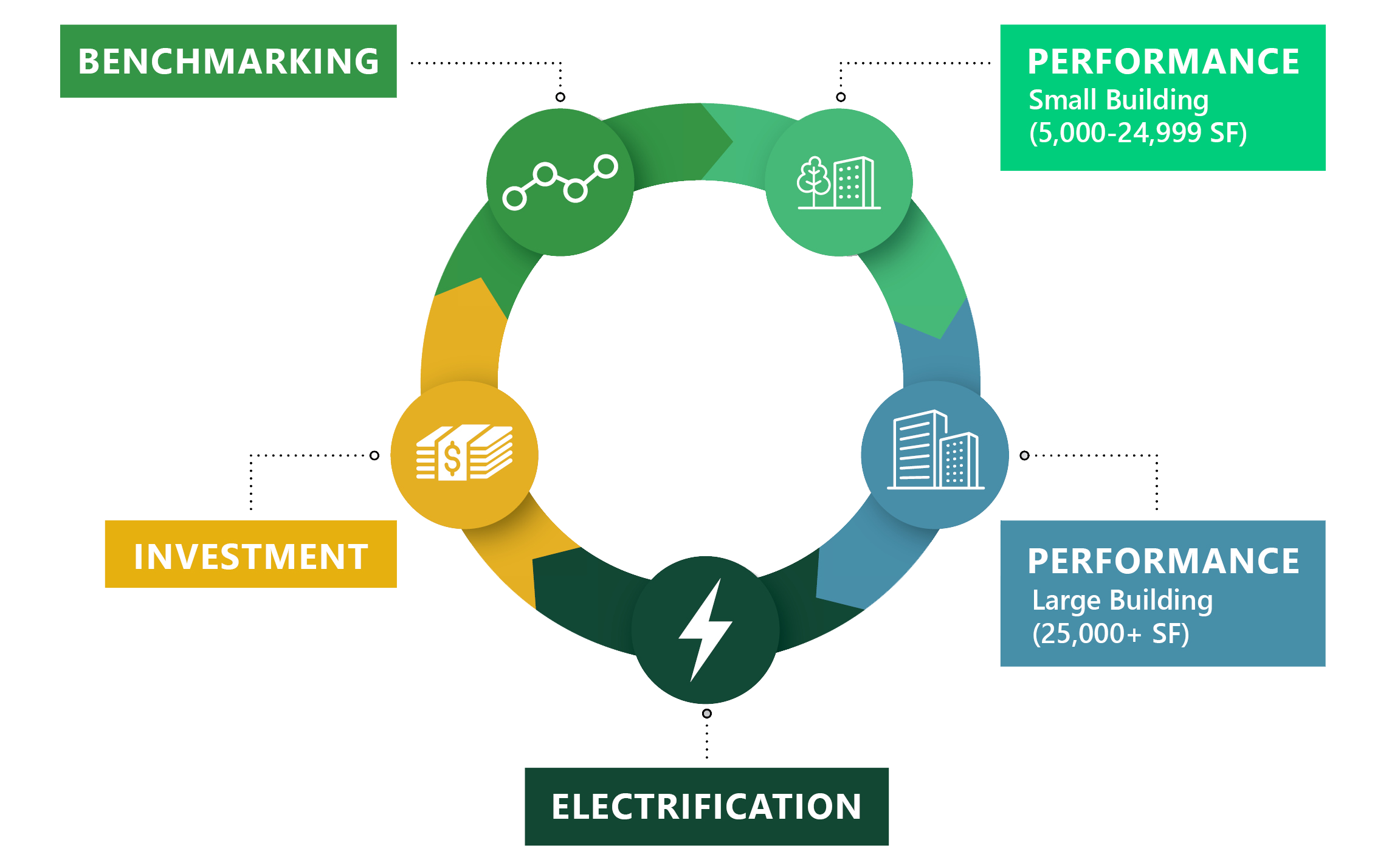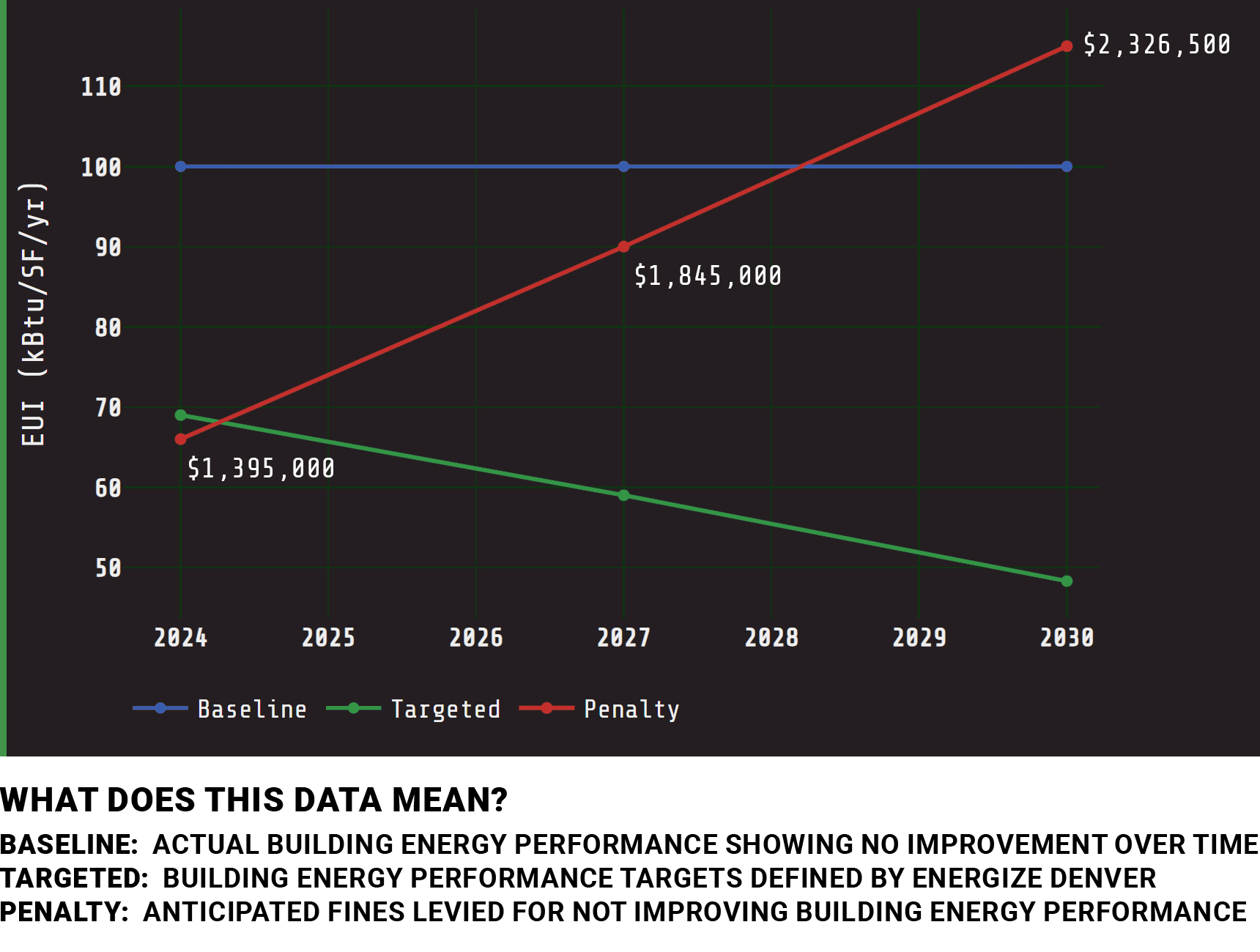CMTA has been getting a lot of questions about the recent updates to the Colorado Building Performance Standards and Energize Denver requirements. In an effort to help explain them individually, as well as how they may interact with each other, we sat down with Damian Smith and John Goodin in Golden to talk about just that.
Both John and Damian have been monitoring the evolving code and building performance standards across Denver, Colorado, and other standards across the U.S. to help guide our clients and projects. Additionally, Damian is part of the Sustainability Advisory Council for Denver's Office of Climate Action, Sustainability and Resiliency (CASR).
What is Energize Denver?
(John) I’ll keep this high-level, and we can dig into more details in a minute. To summarize, Energize Denver is an ordinance that was passed in 2021 and went into effect in early 2023. The thrust of the measure is to reduce Greenhouse Gas Emissions (GHG) by 80% by 2040, reduce building Energy Use Intensity (EUI) across Denver by 30% by 2030, and reach Net Zero energy by 2040.
While Energize Denver is great to help position us for a healthier and more sustainable future, it can get a little complicated. Energize Denver stipulates new permitting processes, electrification incentives, and, most importantly, building performance targets for existing buildings. While building construction has traditionally focused on code enforcement for new buildings and major renovations, Energize Denver includes benchmarking and reporting for existing buildings as well.
Fundamentally, the ordinance is trying to encourage building owners to invest in more energy efficient equipment as they're performing already necessary upgrades to their infrastructure.

What are the updates to the Colorado Building Performance Standards?
(Damian) Similar to Denver's efforts with Energize Denver, the state of Colorado has set goals to reduce Greenhouse Gas Emissions across all market sectors by 90% by 2050 to limit the impact of climate change. Buildings are the fourth largest source of GHGs in Colorado, so improving building performance is integral to meeting emissions goals.
The goal of House Bill 21-1286 is to reduce GHGs created by Colorado’s buildings by 7% by 2026, and 20% by 2030. These percentage reductions are based on 2021 levels. The Air Quality Control Commission (AQCC) published and enacted rules in October 2023 and the first reporting session closed in August 2024. The program applies to commercial, multifamily, industrial, and public buildings 50,000 square feet or larger.
Building owners now have to report how much energy they use every year to the Colorado Energy Office and will have to reduce how much energy their buildings consume. There are three pathways to compliance – the Energy Efficiency Pathway, the Greenhouse Gas Reduction Pathway, and the Standard Percent Reduction Pathway.
The Energy Efficiency Pathway is similar to Energize Denver in that a prescribed EUI target is set based on building type and energy consumption is reduced to meet or exceed the target. The Greenhouse Gas Reduction Pathway also sets a target but examines emissions rather than energy consumption. And finally, the Standard Percent Reduction Pathway allows for a 13% reduction in either EUI or GHG by 2029 and a 29% reduction by 2050. Broadly speaking, we expect high-performance buildings that are already close to the EUI or GHG targets will pursue the first two pathways. Buildings with higher benchmarked energy consumption or emissions that are further from the targets will likely take advantage of the Standard Percent Reduction path. However, all these buildings will be unique and will need careful study to determine the most suitable and cost-effective path.

What are the major differences between the two?
(John) Really, it focuses on building size, tracked metrics, and penalties. While Colorado is focused on a carbon-based strategy of reducing GHG emissions in buildings larger than 50,000 square feet, Denver is requiring buildings larger than 25,000 square feet to reduce their Energy Use Intensity (EUI) which does not consider carbon or the source of energy. There are also additional reporting requirements for Denver buildings smaller than 25,000 square feet. Penalties are a whole other conversation that we can talk about later.
Are there other cities in Colorado that have adopted similar energy standards?
(John) Yes, performance standards have been popping up across the state. Aspen, Boulder, and Fort Collins have all recently passed building performance standards ordinances. Each has similar goals to Energize Denver but have their own nuances and compliance paths.
In addition, similar legislation has been passed nationwide in states such as California, Maryland, and Washington, and cities like Boston, New York City, Washington DC, and Seattle. CMTA is actively tracking the development of these standards since they are a natural fit with our historical expertise in high-performance buildings, LEED and WELL accreditation, and studies for decarbonization or electrification. In short, we’re excited to help owners understand what this means for them. This is where we thrive.
Why are Building Performance Standards needed in the first place? Isn’t that what building codes are for?
(Damian) Yes and no. There has been a broader movement nationally over the past several years to begin addressing emissions from the built environment in a more substantial way. Increasingly strict energy and construction codes (along with LEED, Green Globes, and WELL certifications, among others) have made a significant impact but have primarily focused on new construction. We have a lot of catching up to do when it comes to the existing building stock.
Also, considering that non-residential buildings in our country are typically designed for 50-plus-year life spans, simply improving the performance of new buildings means that the full impact of that investment won’t be seen for another 50 years. Building performance legislation seeks to fast-track that timeline. With these bills, Colorado is ahead of the curve nationally and setting a precedent for decreased carbon emissions.
When will the Colorado Building Performance Standards changes go into effect?
(Damian) As John mentioned before, the CO AQCC enacted rules in late 2023. Benchmarking has been required since January 2022 but penalties and enforcement for failing to submit benchmarking reports have been in place throughout 2024 with the most recent deadline in August 2024.

Speaking of penalties, are there repercussions for building owners who don’t comply with Energize Denver requirements?
(John) Yes, and they are potentially significant. Energize Denver includes fines between $0.30 to $0.70 per kBtu above the performance targets for buildings that do not meet the prescribed targets in 2025. The Energize Denver website includes a case study for a 150,000-square-foot office building that maintains the same annual energy performance from 2019 through 2030. In that time, the owner of that hypothetical office building would be levied between $5.7 and $13.4 million in penalties. Very few building owners have that kind of cash sitting in a bank account.
While not explicitly part of the ordinance, the long-term benefits of improving the operational performance of buildings should be evident for all Denver building owners. Utility bills in Colorado have increased an average of 2.5% every year over the past 15 years. With construction incentives, the payback for reinvestment in building systems has become more attractive. Rather than facing fines and penalties, building owners that capitalize on performance improvements will see a corresponding improvement in operating budgets.
Similarly, will there be repercussions for building owners who don’t comply with the Colorado Building Performance Standards?
(Damian) Yes, there will be monetary repercussions. And they’re no joke. If building owners fail to demonstrate compliance with their targets, they are subject to monthly civil penalties of up to $2000 for the initial violation and $5000 for subsequent violations. They will also be required to submit monthly progress updates to the CEO until they comply with the standards and could be subjected to additional civil suits and injunctions. Nobody wants that. We strongly suggest making the upgrades required by the deadlines stated.
When will the City of Denver and State of Colorado start checking compliance and penalizing building owners?
(Damian) The City of Denver is taking a scaled approach to its penalties until it achieves the energy targets it wants. For Energize Denver, the first compliance year is in 2025. Progressively lower energy targets will be checked in 2027 and 2030 to meet the initial scaled energy goals. Colorado is following a similar path with 2026 and 2030 compliance periods.
Are these penalties a one-time occurrence or will they be done annually?
(John) Energize Denver penalties will be assessed annually. Colorado intends to assess penalties monthly.
What are the best first steps to getting your buildings into compliance with both new regulations?
(John) From a bird’s eye view, compliance starts with benchmarking buildings and tracking utility bills to understand your base energy use today. And in preparation for passing Energize Denver, the City required all building owners to submit their 2019 utility bills to establish performance improvement targets for 2030.
Once benchmarking is complete, the next step is getting a basic understanding of the condition of your building and its systems. Depending on the project, this might be called an Investment Grade Audit or a Decarbonization Plan. Think of them as reduction road maps that are intended to flesh out potential compliance paths. In some cases, adjusting HVAC equipment operating schedules will be adequate; in others, a more holistic renovation of heating, cooling, or building envelope systems might be needed. There is no “out-of-the-box” solution for every building. Each one needs its own unique compliance path.
The approach to meeting the Colorado Building Performance Standards is the same – collect baseline data and create a roadmap to compliance. Both entities are encouraging discussion with owners who have concerns and may allow target and/or timeline adjustments to address various situations like long lead time equipment, unique property types, or financial constraints.
Is there funding available to help cover the cost of the required changes?
(Damian) Yes, there are multiple rebates, incentives, and financing opportunities available. Both Denver and the state of Colorado have active, funded programs to help building owners comply with these regulations. In addition, rebates are available from electric utilities and significant tax rebates are available from the Inflation Reduction Act (IRA). The IRA is a sustainability focused tax incentive program from the Federal government that went into effect in August of 2022. By deploying certain technologies like geothermal, battery storage, or solar photovoltaics in a building renovation or new construction project, building owners can receive tax refunds or direct cash back from the government.
Thank you both so much for your time. We certainly covered a lot of ground and know these programs are constantly evolving. Hopefully as we learn more we can keep this conversation going.
(Damian) and (John) Definitely! Thanks!
For more information on Energize Denver, Colorado Building Performance Standards, & the Inflation Reduction Act, please reach out to John Goodin & Damian Smith.
John's LinkedIn Profile
Damian's LinkedIn Profile